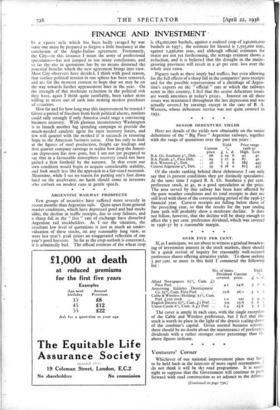ARGENTINE RAILWAY PROSPECTS
Few groups of securities have suffered more severely in recent months than Argentine rails. Quite apart from general market conditions, which have depressed good and bad stocks alike, the decline in traffic receipts, due to crop failures, and a sharp fall in the " free " rate of exchange have disturbed Argentine rail stockholders. As I see the situation, the resultant low level of quotations is just as much an under- valuation of these stocks, on any reasonably long view, as were last year's peak prices an exaggerated reflection of one year's good harvests. So far as the crop outlook is concerned, it is admittedly bad. The official estimate of the wheat crop is 184,000,000 bushels, against a realised crop of 240,000,000 bushels in 1937 ; the estimate for linseed is 1,505,000 tons, against 1,936,000 tons, and although official estimates for maize are not yet forthcoming, the acreage estimate shows a reduction, and it is believed that the drought in the maize- growing provinces will result in a 4o per cent. loss over the whole area sown.
Figures such as these imply bad traffics, but even allowing for the full effects of a sharp fall in the companies' peso receipts and for the possible repercussions of a shrinkage of Argen- tina's exports on the official " rate at which the railways remit to this country, I feel that the senior debenture issues are worth attention at today's prices. Interest on all these issues was maintained throughout the last depression and was actually covered by earnings except in the case of B. A. Western, whose debenture service was not quite covered in 1935.










































 Previous page
Previous page